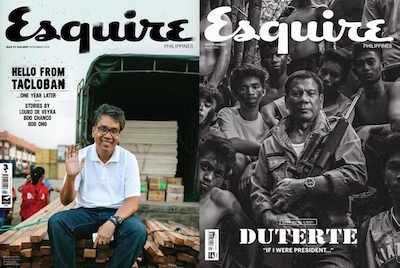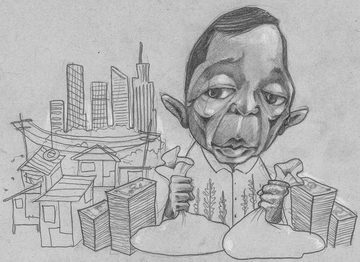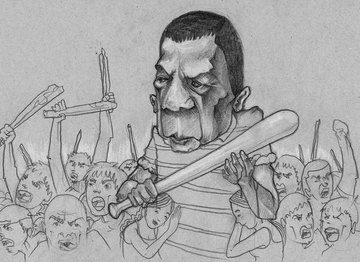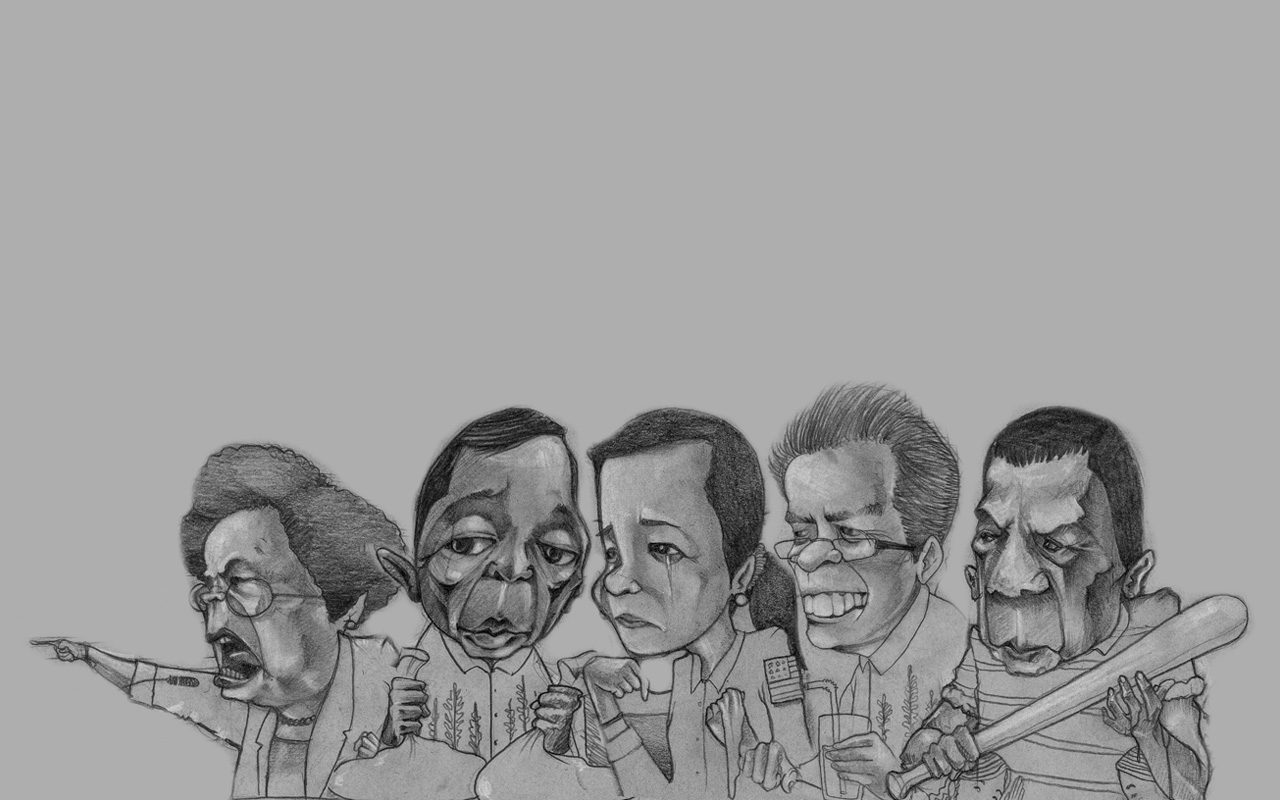SUMMARY
This is AI generated summarization, which may have errors. For context, always refer to the full article.
This compilation was migrated from our archives
Visit the archived version to read the full article.
Illustrations by Geloy Concepcion Design by ANALETTE ABESAMIS and DOMINIC TUAZON
Rappler’s series of
Here, in The Demonized, the second installment, we examine the worst versions of candidates running for President, as imagined by their critics. These profiles condense the range of commentary from political opponents, interest groups, columnists, as well as the grievances that populate both online and offline conversation. We hope to make sense of what frightens, what offends, and what angers a nation in search of a leader.
Mar Roxas has a dream. His life is wonderful, he says. He would like your life to be wonderful too.
He will admit that the last six years haven’t been perfect – but you have to understand, nothing is perfect, and progress is always slow. The big storm that dumped thousands of bodies into the streets of Tacloban was a bad storm, but he did a good job, he really did – didn’t you see him there, on the ground, for a long, long time? The hostage crisis in Zamboanga was a bad deal, but it was the fault of Muslim invaders – didn’t you see him there, all the way to the end? And so the trains are slow, and maybe sometimes they overshoot or stall or injure, but that was the fault of the contractors, and the trains should start again soon, maybe next month.
He’s taken the train, he knows what he’s talking about. Did you know he was the first government official to ride the train? Did you know everyone else just followed his lead? Did you see the picture, did you see him, on a train, standing on the aisle, going to work like all the normal people do?
Look at him, bumping fists with comedians, hammering nails into chairs, dancing with super stars at the pretty green park. There he is on the Christmas card, with his celebrity wife and his fluffy little dogs. Isn’t he great? Wasn’t he cool?
You have to understand, he is a Roxas, and everyone says Roxases win. Didn’t you hear what the President said? Don’t you know what his supporters say? It’s time for Roxas. They promised if he waited he would be next. Please understand, this is his turn, it is his time, he’s earned this and deserves this, look at the rules, see the posters – ask his mama who her good boy is.
The incompetent
The secretary of the interior makes for the perfect whipping boy. He can’t take a joke. He can’t slug it out in the press. He is a safe target for every bully with a spitball and a baseball bat. His varying attempts at defending himself has the distinct flavor of a whining thirteen-year-old who just got trounced in the playground. Listen to him on television, complaining about unfairness, droning on about rules, rambling about his successes, unable to stand up to candidates whose attacks on his incompetence remind the public just how royally he fails in a crisis.
Analysis by paralysis, is how Vice President Jejomar Binay described Roxas’s leadership style. He has lost all trust, said Senator Grace Poe, so much so that his own president chose to confide in a suspended police chief over the man who was once his running mate. Davao City Mayor Rodrigo Duterte called Roxas a pretentious fraud, an executive so inept that convicts could get happily high on crystal meth inside his jails without fear of punishment.
The accusations of incompetence in the most recent presidential debate are nothing new, particularly in an era where social media chatter, editorial commentary and dinnertime conversation all reduce Mar Roxas into a bungling oaf who can’t ride a motorcycle without falling on his face. He may have years of political experience and the Wharton degree he so passionately defends, but he can claim no single defining achievement that can stand against the glorious mythology of Davao and Makati. His legacy is one rife with desperation and public frustration – Tacloban, Zamboanga, and the daily inhumanity of the MRT. Mar Roxas, the man who was once called a “global leader of tomorrow” has become the face of the Aquino government’s long series of public failures.
“I’m pissed at Mar,” said a call center agent in a video that went viral. “Our misery is his fault.”
There is a picture that tells the story best, shot in the weeks after Haiyan reduced Eastern Visayas into rubble. In the photo, what looks to be donated lumber is piled into stacks. There are aid workers in bright red vests going about their business. At the center sits Mar Roxas, secretary of the interior, representative of the president, collared white polo tucked into perfectly pressed jeans. His hand is up in a wave, his lips stretched into a grin.
Hello from Tacloban. This is how we roll.
Roxas’ attempts at engagement – carrying sacks of onions, awkwardly playing with children, directing traffic in the highway – have been openly mocked, every misstep translated into 140-character jokes.
Roxas has his own diagnosis for the public’s contempt. His behavior, he said, could be interpreted as aloofness.

“I mean no ill-will. I”m just passionate and impatient for solutions and that’s what drives me to push for exactly what’s happening.”
But it is the same obsessive passion for intricate solutions that fails to resonate in a country where immediate solutions are key. It is no accident that Roxas’s meandering deliberation has often been compared to Rodrigo Duterte’s politics of “I will.” Roxas fixates on details, explaining his “deliberate, programmatic and sustained” policies without the urgency called for by the situation on the ground.
Whatever successes Roxas may have achieved diminish in the face of his inability to demonstrate any understanding of human suffering. When CNN’s Andrew Stevens observed in Tacloban that relief operations “did not happen quickly enough” as people starved, Roxas went on to dispense a lecture on response doctrine for local governments. The exchange was convoluted enough to push the anchor to tell the secretary, “Surely, you need to override bureaucracy in this situation.”
It is this that makes endearing Roxas to voters a challenging task. Roxas may claim good intentions, but his distance from daily realities is such that he compares the election of a president to the selection of a chauffeur.
“If we compare choosing a president to choosing who will drive our children every day – whom will we choose? To whom will we trust the safety of our children?”
It is a damning example. Here is a candidate so out of touch with with his own constituency that he is unable to grasp that the majority of parents in the Philippines do not own cars, cannot afford private school buses, and consider themselves lucky when their children can go to school at all, even when they are forced to wade barefoot through rivers or risk getting run over by trucks thundering down the highways.
“I have no drama,” Roxas’s newest campaign slogan, may have been his strongest narrative yet, but it highlights the continuing criticism against the scion of the Roxas clan. By casting himself a distant observer in what for him is merely theater, Mar Roxas cannot understand, much less relieve, the small, everyday tragedies that mark the lives of millions of Filipinos.
The cacique
Roxas and his camp dismiss the catalogue of grievances as outpourings from opponents with axes to grind. “I think that you know, by definition they’re from critics so what do you what expect?” His inability to connect is painted as a mere character flaw, heavily outweighed by his experience, apparent incorruptibility and the policy proposals he so painstakingly explains.
And yet the public derision he inspires may be more visceral – a nation’s rejection against the kind of politics responsible for the elitist character of Philippine democracy. His name is Manuel Araneta Roxas, heir to an illustrious clan of sugar barons and political heavyweights, the son dragged from his stockbroker career in New York to fill the shoes of his dead politician brother. It is cacique rule proving its longevity. His is a historical legacy of rival oligarchs using elections to compete for power, a heritage whose worldview flings the country back to the feudal logic of the landed elite.
For Mar Roxas, “You have to understand, you’re a Romualdez, and the President is an Aquino,” is an obvious rationale for making life difficult for a local mayor.
Perhaps of all the candidates for the presidency, it is Roxas whose narrative is in constant flux. After the aborted attempts at presenting Roxas as the beloved man of the people, the campaign reimagined him as Mar Roxas the hardworking bureaucrat, without airs and without ego. Theirs is the brilliant technocrat in shirtsleeves, focused on his people’s future.
Now his life is framed to serve as aspiration. His upbringing, he said, was his inspiration to work harder and serve the people better. Charm or popularity is not a factor here, only results. Whether this new apparent frankness is effective at all has yet to be proven. The many threads of Roxas’ public narrative may already be hopelessly tangled, with no assurance that the blundering machinery behind the Liberal Party campaign can commit to a single arc.
Yet beyond the chaos of the yellow campaign, what has not been addressed is the fact that Mar Roxas’ success is anchored to a legacy of privilege. The story is in the name, and the name that made the man. Mar may be for the people, but he is not of the people.
The next president
There was a time when Mar Roxas topped the senatorial race. He was at the center of giddy gossip over his romance with a broadcast anchor. He was the glad-handing Mr Palengke cheered on by street vendors. Before the rise of Benigno Aquino III, Roxas was the man everyone understood would be the next president.
“You were Mr. Excitement in 2004,” observed the Philippine Daily Inquirer at a multimedia interview. “What was going for you at that time, which others might not appreciate today?”
In 2004, Mar Roxas was a legislator. He was allowed to sit at his desk on the senate floor and dissect nuances and clauses to his heart’s content. He had never been faced by a wall of water, had never seen hostages used as human shields, had never demonstrated his stunning incompetence in a country where the sky falls with clockwork regularity.
The Mar Roxas of 2016 is a different man. His failures cannot be squared away by legislative revisions. They are paid for in homes and jobs and coffins draped in red and blue flags.
Mar Roxas’ dream is to make your life as wonderful as his. It is may be a good dream, a bright dream, but it is an empty promise, because the state of your nation is beyond his comprehension.
You have to understand, he is a Roxas, and everyone says it is time for a Roxas win. The rules say he should, his friends say he should, it’s his turn, it’s his time, he’s a good man with a good
Editor’s Note: All quotations have been translated into English. This is The Demonized, the second installment of The Imagined President series, where Rappler examines the negative images of candidates running for President as imagined by their critics. We hope to make sense of what frightens, what offends, and what angers a nation in search of a leader. For Part 1, The Idealized version of former Department of Interior and Local Government Secretary Mar Roxas” profile, read Mar of the People.

Patricia Evangelista is Rappler’s multimedia manager. She is an international fellow of the Dart Center Ochberg Fellowship for Trauma Reporting and was awarded the Kate Webb Prize for exceptional journalism in dangerous conditions. In 2016, she received The Outstanding Young Men award for the field of journalism. Tweet her @patevangelista.
Nicole Curato is a sociologist from the University of the Philippines. She is currently a Discovery Early Career Research Award Fellow at the Center for Deliberative Democracy & Global Governance based in Canberra. In 2013, she received The Outstanding Young Men award for the field of sociology. Tweet her @NicoleCurato.
Checking your Rappler+ subscription...
Upgrade to Rappler+ for exclusive content and unlimited access.
Why is it important to subscribe? Learn more
You are subscribed to Rappler+
Join Rappler+ Donate Donate UPGRADE TO RAPPLER+ TO COMMENT JOIN RAPPLER+ TO COMMENT








There are no comments yet. Add your comment to start the conversation.